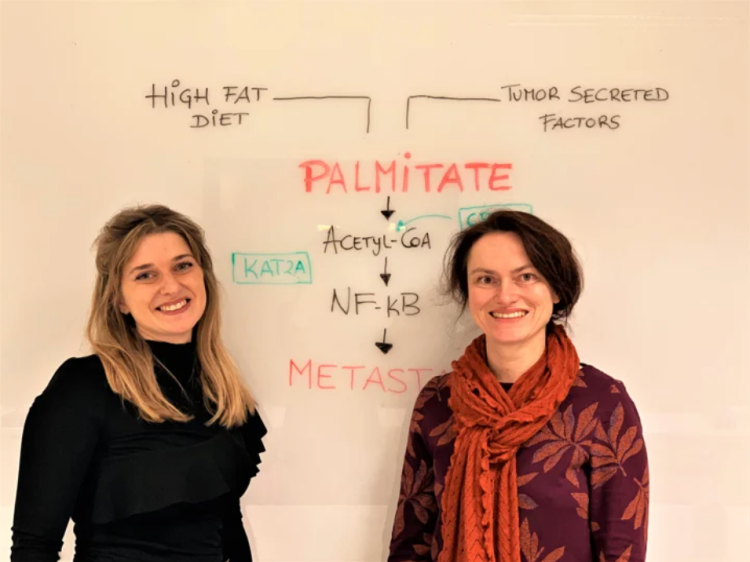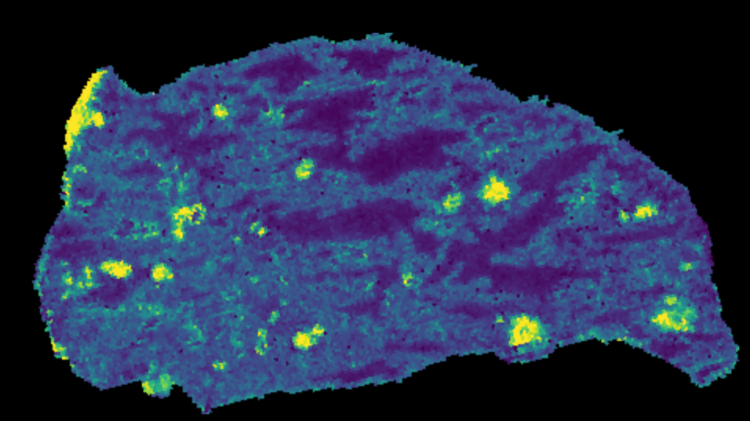Fat creates an ideal environment for metastatic breast tumors
A research group led by Prof. Sarah-Maria Fendt and Dr. Patricia Altea-Manzano from the VIB-KU Leuven Center for Cancer Biology has uncovered that frequent metastatic sites, such as the lung and liver, are enriched in lipids. The building blocks of lipids, more specifically the fatty acid palmitate, can initiate a series of signals in cancer cells that equip them to grow into metastases. The availability of palmitate further increases with a high-fat diet. This discovery further illustrates the importance of diet for cancer progression.

Belgium has the highest breast cancer incidence in Europe. According to the Foundation against Cancer, approximately 15% of all cancer diagnoses in 2020 were attributed to breast cancer in women. What’s more, nearly 1 in 9 women is confronted with a breast cancer diagnosis during their lifetime, making it the most common form of cancer for women. At early-stage diagnosis, breast cancer is mostly curable. However, once a tumor metastasizes and cancer cells spread throughout the body to form tumors in distant organs, the survival rate for patients drops to less than 30%.
Obesity, which can resul from high fat intake via our diet, is a major risk factor for metastasis formation. Yet, it remains largely unknown how fat promotes this detrimental process. As a consequence, current therapies are typically not tailored to overweight breast cancer patients. Now, the research group of Sarah-Maria Fendt has been able to uncover the role of a specific fatty acid for metastasis in breast cancer, opening the way to further research into how diet can play a role for the treatment and prevention of metastasis in patients.
Palmitate: A small fatty acid with a large influence
Fatty acids are the building blocks of the fat we eat. There are many kinds of fatty acids, but some are more present than others in what we eat on a daily basis. One such fatty acid is palmitate, commonly found in seed oil, meat, milk and ultra-processed foods. In a paper published in Nature Cancer Dr. Patricia Altea-Manzano and Prof. Sarah-Maria Fendt (VIB-KULeuven Center for Cancer Biology) found that breast cancer cells secrete molecules which increase the palmitate concentration in the lung. The cancer cells that reach the lung afterwards use this palmitate to promote metastasis.
Patricia Altea-Manzano: “We already knew that palmitate is an important nutrient for cancer cells. However now, we found that those cancer cells that are disseminated in the organ where metastasis occurs, can break down palmitate into even smaller molecules. Moreover, palmitate induces an enzyme in these cancer cells that attaches those smaller molecules to proteins known to promote the ability of cancer cells to eventually grow into metastases.”
Just like in a relay race, palmitate is the first player to pass down the baton in a series of interactions at the molecular level that form a metastatic pathway. Ultimately the chain reaction of signals caused by palmitate’s interaction with specific proteins results in the ability of cancer cells to grow into distant organs.
Lung tissue showing palmitate concentrations (yellow) where metastatic tumors are located.

Lung tissue showing palmitate concentrations (yellow) where metastatic tumors are located.
Leveraging fatty acids to prevent metastasis
Having found that palmitate plays a role in metastasis, the research group investigated whether blocking the palmitate breakdown could halt the formation of metastases. With success: the increase in metastases induced by a high-fat diet was completely abrogated when palmitate breakdown in cancer cells was blocked. Additionally, in patients with breast cancer the group found evidence for a correlation between the presence of palmitate in organ fluids and high activity of the pro-metastatic protein induced by palmitate in metastases growing in these organs.
Sarah-Maria Fendt: “The next steps will be to identify compounds that can target palmitate breakdown and investigate whether those can be used in patients in the future. In a long-term perspective, we hope to open up a therapeutic strategy against metastasis, which is tailored to treat overweight patients. This is highly relevant because about 50% of patients with breast cancer are overweight and tailored therapies for these patients are still missing.”
Further research on the role of palmitate and strategies to block its interactions relating to the formation of metastases will be necessary.
The research described in this paper was made possible, among others, thanks to FWO, the Baillet Latour fund, the Beug Foundation, the Marie Sklodowska-Curie fund and Stichting tegen Kanker.
